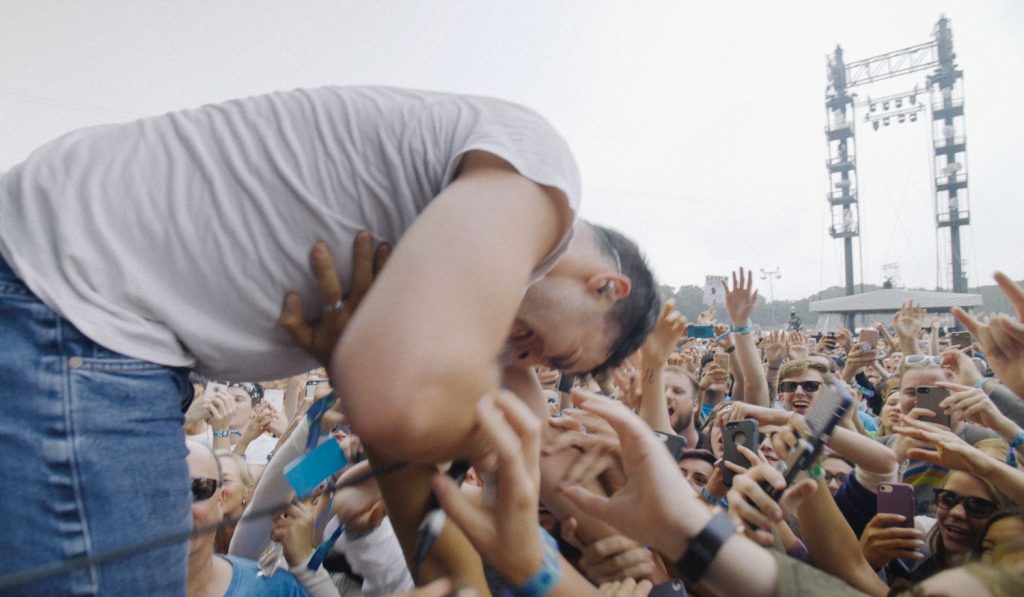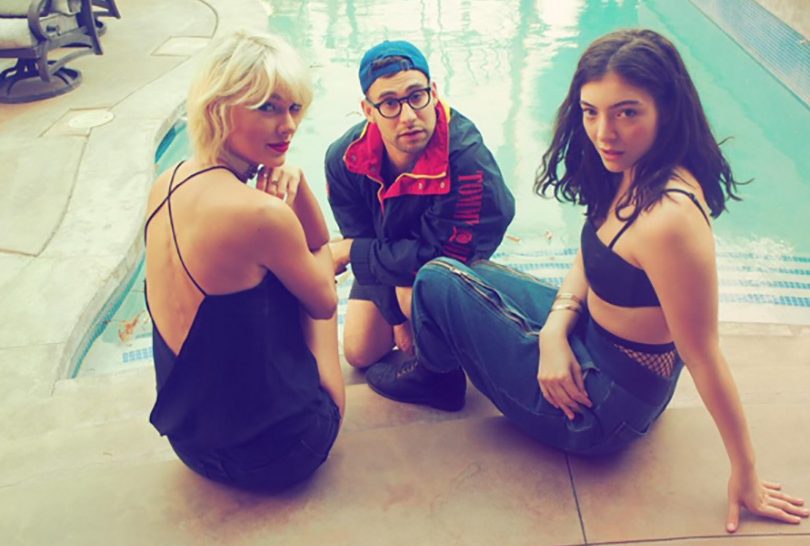We Talk Lorde, Taylor Swift And Perfect Pop With Jack Antonoff
"I'd rather be me than the next Max Martin."

There are many ways to know Jack Antonoff.
You could know him as the guitarist and songwriter of the massively successful band fun., who scored a worldwide hit (and a Grammy) for ‘We Are Young’ back in 2011. Or you could know him by his artist moniker Bleachers, the ’80s pop rock project he officially kicked off in 2014 after a decade of hesitation and consideration.
Or, more recently, you might know him as the in-demand pop producer who has leant his Midas touch to some of this decade’s biggest records, including Lorde’s Melodrama, Taylor Swift’s ‘Out Of The Woods’, and St Vincent’s MASSEDUCTION.
Or you could know him as all three, in which case you’d almost certainly agree with us when we say this: Jack Antonoff is one of the most influential people working in pop music right now.
But if you were to put that to Jack Antonoff, he would probably laugh and shrug it off — maybe throw in a self-deprecating comment for good measure. When Music Junkee caught up with Jack over the phone from his home in Brooklyn, he was modest to an extreme, and more than a little reserved about his working relationship with artists like Swift and Lorde.
What he was open about, however, is his unwavering obsession with and dedication to pop music — and his want to be himself, and only himself.
This Bleachers record was the first where you’ve invited people into the studio to collaborate on your own music. What was that process like?
It was great. I had a strong sense that I could really just learn a few things from people. And I didn’t feel scared that anyone was going to screw it up or anything like that. I just felt very open because I had a very clear vision of what I wanted to do and sometimes the more clear you are in what you want, the more space you have to find out if there’s anything else worth looking for.
I’ve heard you say that loss is the only thing worth hearing from an artist. Why’s that?
I just think that loss — and what it’s like to be mortal and have to deal with that and have to deal with nothing being permanent — is a massive part of me. I don’t know if I agree with me saying that that it’s the only thing, but it’s something that I think informs so many things. It informs sadness. It informs joy. It informs everything.
It’s just a huge, huge connection to any sort of deep feeling because what you look for in song, you want things to cut deep.
Is Bleachers your way of exploring all those feelings around mortality and loss?
Yeah definitely. I mean, there’s always space for other things to write about, obviously. But there was just something in those themes that really speaks to me, that I keep going back to. And I keep defining a lot of what I’ve been through through that.

Antonoff on stage as Bleachers at Outside Lands Festival. Photo via Facebook.
You’ve worked as a producer on some of the biggest pop records this year. What do you look for in the pop acts that you work with?
The biggest thing is the personal connection that I’m looking for. You look for a personal connection and then you also look for a shared language.
It’s very basic in some ways, you know. There’s certain sounds or melodic intervals that offend me, that I find gross, you know what I mean? It’s almost like if you were going to cook food with someone, you want to have a similar sensibility.
And that’s not to say you don’t want to learn from some people — but just, because it’s such a wide world of melodies and lyrics and sounds, you at least want to agree on a general language. If you do, then you just have a much better shot of being able to create something good together.
Do most of the acts you work with tend to be in your social sphere?
Not really. A lot of people become friends, but…often I meet people in the most random ways.
I’ve heard you talk in particular about the making of ‘Liability’ off of Melodrama. Is that track an example of a perfect pop song to you?
[Laughs] I don’t want to call anything I did perfect, because that’s for someone else to say. So phrased differently, I would say what I love about that song is that it takes an unrelatable concept and makes it somewhat relatable.
She took that idea, that everything that changed in her life, and then she framed it in a way where everyone could understand it and everyone could relate to it — that means a lot to me.
And that’s what pop music is, isn’t it? It’s trying to take those big, universal themes and distill them into something that everyone recognises.
Yeah, without ever cheapening it. That’s the other part, without ever cheapening it. You never want to lose the beauty of it and the glory.

Taylor Swift, Jack Antonoff, and Lorde at Coachella. Photo via Taylor Swift Instagram.
Which is what makes Taylor Swift such an amazing songwriter, too, because she’s always had that gift of distilling these really almost crazy, universal themes and putting them into gut-punching lyrics.
Exactly. Making something so complicated come off so simple is so incredibly hard — and it’s at the heart of what’s exciting about pop music. If you only have three minutes to make your point you don’t want to compromise it, you have to find a very powerful way to do it.
So obviously you worked on Melodrama and Reputation. Was there a particular track from either of those two records that stood out as your favourite?
It’s hard to say. A lot of the things I worked on this year just mean so much to me in general. It’s hard to pick one out, because I see them as full bodies of work.
Many people have referred to you as the new Max Martin, in terms of your influence on pop music. What do you think when people write or say that?
It just seems like they’re trying to contextualise it… but I don’t want to be the new anyone, to be honest. I have my own approach to things and the part that really matters to me is remaining in my space and holding onto the traditions of why I do this and how I do it, and not changing based on success or expectations or any of that.
“If you only have three minutes to make your point you don’t want to compromise it.”
But I also have to remind myself that there’s languages and tools that some press need to speak in, in order to make their point and not make everything 10,000 words. But I don’t feel like the ‘next anyone’. I just feel like I’m making the records I’ve been working hard to make. There’s not much to it besides that. And that’s a funny thing for a lot of people, specifically press.
The nature of press is trying to contextualise and put into perspective. So I guess that’s a nice soundbite, but I’d rather be me than the next Max Martin.
When you’re working in the studio with artists like Lorde and Taylor, what’s the first thing you do? Do you sit down and have a chat? Do you play some chords on the piano? Do you come in with ideas? What’s your studio process like?
There’s no good way to start. Because sometimes you’re just full of ideas and you have to say it right away so you just fly into the studio and start working. Sometimes you’re just sitting there talking. The one thing about making records and writing is that it’s not like doing a puzzle. It’s constantly shifting and there’s no way to do it better. It just goes. And you learn things and you mess things up and you try new things and that’s how it goes.
Can you talk me through the process of ‘Look What You Made Me Do’? How did that song came about?
That song came about the way a lot of songs on that album came about, which was truly out of just sitting in a room and messing with things and trying new ideas and looking at the things Taylor wanted to say and experimenting with different ways they could work. It’s hard to describe. That’s kind of the beautiful thing about it being an insular process is no one really knows besides her and I, and I kind of like that.
There were a lot of things written about that song, obviously. It was one of the biggest songs of the year. What is it like seeing a song like that, of yours and hers, scrutinised on a global stage? That must affect you in some way.
I don’t spend a lot of time thinking about that side of it — it’s not my job to critique things or explain things. It’s my job to make things. I leave all my focus in the studio. I’m just constantly returning back to that place.
And also when something comes out, I’m usually pretty far beyond it at that point. To be honest, the way that people communicate nowadays, I don’t hold a lot of stock in it. I mean, the one thing that I love more than anything is the live show when I play. That’s sort of where I get all of my information.
Speaking of that, I was re-watching your MTV Unplugged set this morning. What is it like to strip those songs down? Do you enjoy taking a big song like ‘Don’t Take The Money’ and putting it on piano?
Definitely, it’s very powerful for me because a lot of the music is written that way. So it’s actually more natural than I think people would assume. It kind of feels like coming home a little bit.
What’s funny about that MTV set is we recorded that in April. I had just finished making Gone Now. So the album was just brand new, and nothing was out yet. So the first performance of the album, after two years of working on production and making songs sound the way they did, was to take it all back to how they sounded when I started them.
So it was very sort of ironic and kind of amazing to work so long on this thing and have everything start on acoustic guitars and pianos and what not, and then for the first live performance just shred it all back to that space.
You’ve worked on some of the biggest pop albums of the last five years. Do you think about whether you’ll leave a bigger musical legacy with your production and songwriting, or through your artist project with Bleachers?
I don’t really think about things like legacy, because I don’t know what that would necessarily…I just don’t know how that would affect me to think about it. To be really honest, my only consideration right now is to just stay focused on touring and making records.
I don’t spend a lot of my time thinking about how it all is perceived. It’s not a good place to live.
—
Jules LeFevre is Staff Writer for Music Junkee and inthemix. She is on Twitter.
—
Jack Antonoff is supporting Paramore on their upcoming Australian tour. Tickets are on sale now.

